T wave inversion Study guides, Class notes & Summaries
Looking for the best study guides, study notes and summaries about T wave inversion? On this page you'll find 996 study documents about T wave inversion.
Page 3 out of 996 results
Sort by
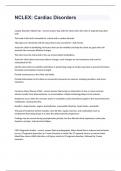
-
NCLEX: Cardiac Disorders fully solved 2024
- Exam (elaborations) • 13 pages • 2024
- Available in package deal
-
- $17.99
- + learn more
NCLEX: Cardiac DisordersCardiac Disorders NCLEX Tips - correct answer Stay with the client when the client is experiencing chest pain. The head of the bed is elevated for a client with a cardiac disorder. Vital signs are monitored and the apical heart rate counted for 1 full minute. Assist the client in identifying risk factors that can be modified and help the client set goals that will promote the necessary lifestyle changes. The client must be instructed in the use of prescribed medicatio...
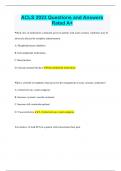
-
ACLS 2023 Questions and Answers Rated A+
- Exam (elaborations) • 35 pages • 2023
- Available in package deal
-
- $10.99
- + learn more
ACLS 2023 Questions and Answers Rated A+ Which class of medications commonly given to patients with acute coronary syndromes may be adversely affected by morphine administration A. Phosphodiesterase inhibitors B. Oral antiplatelet medications C. Beta blockers D. Calcium channel blockers Oral antiplatelet medications What is a benefit of morphine when given for the management of acute coronary syndromes? A. Central nervous system analgesia B. Increases systemic vascular resistance C. Incr...
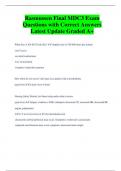
-
Rasmussen Final MDC3 Exam Questions with Correct Answers Latest Update Graded A+
- Exam (elaborations) • 34 pages • 2024
- Available in package deal
-
- $12.49
- + learn more
Rasmussen Final MDC3 Exam Questions with Correct Answers Latest Update Graded A+ What does A Fib ECG look like? -impulse rate of 350-600 times per minute -no P waves -no atrial contractions -loss of atrial kick -irregular ventricular response How often do you assess vital signs on a patient with a dysrhythmia (gray box) at least every 4 hours Nursing Safety Priority for Sinus tachycardia what to assess (gray box) -fatigue, weakness, SOB, orthopnea, decreased O2, increased HR, decre...
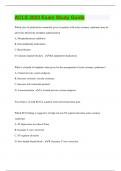
-
ACLS 2023 Exam Study Guide
- Exam (elaborations) • 29 pages • 2024
- Available in package deal
-
- $9.99
- + learn more
ACLS 2023 Exam Study Guide Which class of medications commonly given to patients with acute coronary syndromes may be adversely affected by morphine administration A. Phosphodiesterase inhibitors B. Oral antiplatelet medications C. Beta blockers D. Calcium channel blockers - Oral antiplatelet medications What is a benefit of morphine when given for the management of acute coronary syndromes? A. Central nervous system analgesia B. Increases systemic vascular resistance C. Increases ...
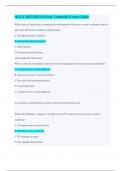
-
ACLS 2023/2024 (Newly Updated) Exam Guide
- Exam (elaborations) • 28 pages • 2024
- Available in package deal
-
- $13.99
- + learn more
ACLS 2023/2024 (Newly Updated) Exam Guide Which class of medications commonly given to patients with acute coronary syndromes may be adversely affected by morphine administration A. Phosphodiesterase inhibitors B. Oral antiplatelet medications C. Beta blockers D. Calcium channel blockers Oral antiplatelet medications What is a benefit of morphine when given for the management of acute coronary syndromes? A. Central nervous system analgesia B. Increases systemic vascular resistance C....
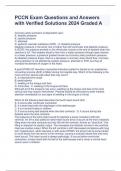
-
PCCN Exam Questions and Answers with Verified Solutions 2024 Graded A
- Exam (elaborations) • 56 pages • 2024
-
- $14.49
- + learn more
Coronary artery perfusion is dependent upon: A. diastolic pressure B. systolic pressure C. afterload D. systemic vascular resistance (SVR) - A. diastolic pressure Diastolic pressure in the aortic root is higher than left ventricular end-diastolic pressure (LVEDP), the pressure exerted on the ventricular muscle at the end of diastole when the ventricle is full. This enables blood to flow from a higher pressure through open arteries to a lower pressure, a pressure gradient known as coronary a...
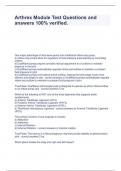
-
Arthrex Module Test Questions and answers 100% verified.
- Exam (elaborations) • 20 pages • 2023
- Available in package deal
-
- $13.39
- 1x sold
- + learn more
Arthrex Module Test Questions and answers 100% verified. One major advantage of dual wave pump over traditional inflow only pump: a) Inflow only pumps allow for regulation of fluid pressure automatically by controlling outflow b) DualWave pumps require constant manual adjustment to of outflow to maintain pressure in the joint c) DualWave pumps automatically regulate inflow and outflow to maintain a constant fluid pressure in joint d) DualWave pumps only feature active ou...
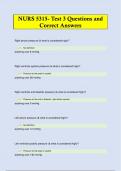
-
NURS 5315- Test 3 Questions and Correct Answers
- Exam (elaborations) • 24 pages • 2024
-
- $12.49
- + learn more
ST Elevation Myocardial Infarction (STEMI) ~ Myocardial infarction which results from a thrombus permanently lodging in the vessel which results in the progression of the myocardial infarction to include the entire thickness of the ventricular wall Cardiac Troponins ~ Very reliable way to diagnose MI -Can be detected in 2-4 hours after onset of pain and should be monitored -They peak at 24 hours and disappear within 7-10 days Myocardial ischemia ~ This is marked by T wave inversion ...
![PCCN Exam Review questions & Answers, VERIFIED/[LATEST EXAM UPDATES]](/docpics/5378043/664baee34d320_5378043_121_171.jpeg)
-
PCCN Exam Review questions & Answers, VERIFIED/[LATEST EXAM UPDATES]
- Exam (elaborations) • 71 pages • 2024
- Available in package deal
-
- $11.49
- + learn more
PCCN Exam Review questions & Answers, VERIFIED/ Coronary artery perfusion is dependent upon: A. diastolic pressure B. systolic pressure C. afterload D. systemic vascular resistance (SVR) - -A. diastolic pressure Diastolic pressure in the aortic root is higher than left ventricular end-diastolic pressure (LVEDP), the pressure exerted on the ventricular muscle at the end of diastole when the ventricle is full. This enables blood to flow from a higher pressure through open arteries to a...
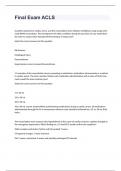
-
Final Exam ACLS 2024 with 100% correct answers
- Exam (elaborations) • 18 pages • 2024
-
- $16.49
- + learn more
A patient experiences cardiac arrest, and the resuscitation team initiates ventilations using a bag-valve-mask (BVM) resuscitator. The development of which condition during the provision of care would lead the team to suspect that improper BVM technique is being used? Select the correct answer to this question. Rib fracture Esophageal injury Pneumothorax Hypertension correct answersPneumothorax 1 A member of the resuscitation team is preparing to administer medications intravenously to...

$6.50 for your textbook summary multiplied by 100 fellow students... Do the math: that's a lot of money! Don't be a thief of your own wallet and start uploading yours now. Discover all about earning on Stuvia


